Review
Drive My Car
Sydney Film Festival (November 3–21, 2021)
Rating: Four and a half stars (out of five)
Drive My Car, directed by up-and-coming filmmaker Ryusuke Hamaguchi, is a whopping three-hour long drama about confronting secrets of the past. The opening titles begin 40 minutes into the film, over sensuous shots of the theatre director Yusuke Kafuku (played by Hidetoshi Nishijima) driving his retro red Saab 900.
This ends the film's prelude set in Tokyo which gives us a glimpse into the private life of Kafuku and his wife Oto (Reika Kirishima), who recites mysterious stories while the two engage in sex. We are also shown, quite matter-of-factly, Kafuku walking in on Oto cheating on him with a young actor named Koji Takatsuki (a devilishly handsome Masaki Okada).
After the opening credits, the story jumps forward two years to Hiroshima, after Oto's death. Here, Kafuku is to stage an experimental version of Anton Chekhov's Uncle Vanya – in which multi-ethnic actors, one of which is Takatsuki, play the roles in a cacophony of languages including Japanese, Mandarin, Tagalog and even Korean Sign Language.
The emotional resonance of the entire third act rests upon a road trip sequence to Watari's hometown in Hokkaido.
It is here he meets Misaki Watari (Toko Miura), a young woman who will be his personal driver for the coming weeks, and the two gradually form a connection.
Despite the film's formidable length, by the magic of Hamaguchi's filmmaking craft, it never drags or feels boring. Although your bottom might be sore from sitting down for three hours, your heart and mind will be thankful for the ride that Hamaguchi takes you on.
Adapted from a short story by famed novelist Haruki Murakami, the script (which won Best Screenplay at Cannes this year) by Hamaguchi and Oe Takamasa draws upon novelist Murakami's repressed emotions and weaves a profoundly touching tale. The film is checkered with conversations in which characters drop their stoic facades and open up to one another about their anguish and anxieties. Many of these scenes take place in Kafuku's car, with the enclosed place taking on an almost sacred, spiritual resonance.
The film draws upon characteristics of other storytelling mediums; its length reveals novelistic ambitions, the title refers to the Beatles' song, and Chekhov returns time and time again to underpin the pervasive melancholy.
Extended scenes are devoted to rehearsals of the play that Kafuku is directing, as the actors recite lines from Uncle Vanya ad nauseum until real emotions are unearthed in their performances. These scenes take on an unnerving meta quality, with Chekhov's dialogue not only reflecting the thoughts of characters in the play, but also the hidden sentiments of the characters in Drive My Car, and even the innermost feelings of us, the audience.
Kafuku, Watari and Takatsuki are each uncomfortable in their own skin, attempting to flee from themselves. As secrets float to the surface, they bond with one another in unexpected ways. The central relationship that holds the film together ends up being the one between Kafuku and his driver Watari. She begins as simply a silent viewer, much like the audience, but when Kafuku gradually warms up to her, the two share their grief. The emotional resonance of the entire third act rests upon a road trip sequence to Watari's hometown in Hokkaido.
Nishijima and Miura's understated, nuanced performances are perfect in embodying pain, recalling Tony Leung from In the Mood for Love or Ryan Gosling in Drive. The other performances are also all exquisite. Park Yoo-rim and Sonia Yuan shine when their characters play out a tense scene from the Chekhov play. Park's character Lee Yoon-A acts using Korean Sign Language and Yuan's Janice Chang is speaking in Mandarin, yet the chemistry is electric, and the drama rings true. Perhaps this is what the play-in-the-film's director Kafuku, and by extension the film's director Hamaguchi, is trying to depict – that true understanding and communication comes not from simply speaking, but a genuine, vulnerable release of one's emotions.
The ostensibly slow and alienating style – with cinematographer Hidetoshi Shinomiya's icy camera framing characters as if they are animals in a zoo exhibit – invites the audience to step into the world of the film. At the end, what emerges is a rich, cathartic story about making peace with one's past, accepting one's present and holding optimism for one's future.
Hamaguchi has pieced together an intricate, enthralling film that lingers on the mind. Its philosophical approach to the human condition is never pretentious, and only seems like a chore on the surface. It is a delight to experience. Hamaguchi takes his time with his characters and expects us to do the same. Those who sit patiently for three hours will be rewarded with a humanist, novelistic epic.
Drive My Car screened at the 2021 Sydney Film Festival. It will be released in Australian cinemas on February 10, 2022.
Kevin is a Media (Communications and Journalism) Honours student at UNSW who has also written for Tharunka and Blitz. He is passionate about cinema, gastronomy and history.
